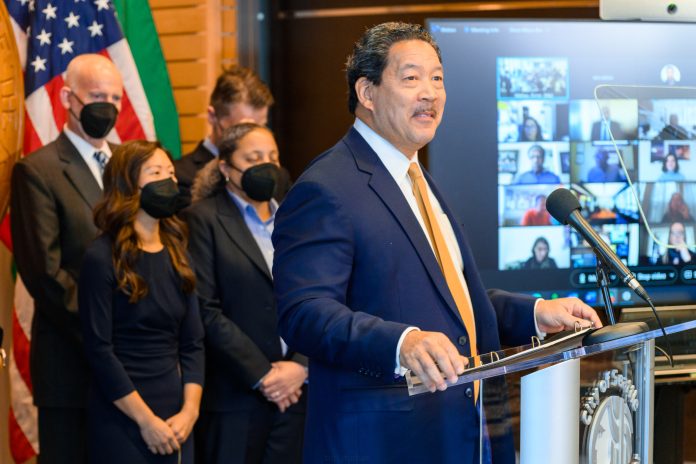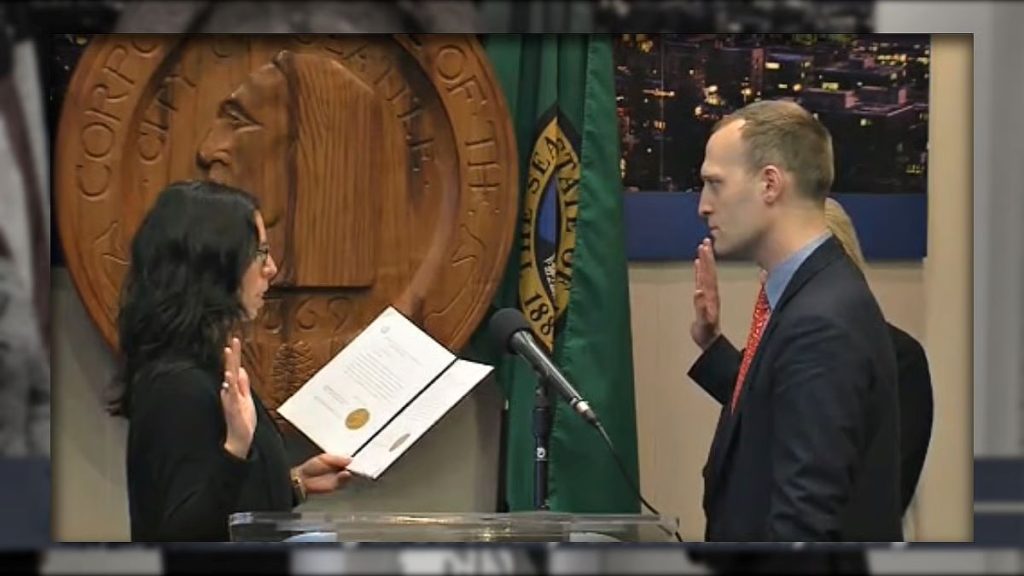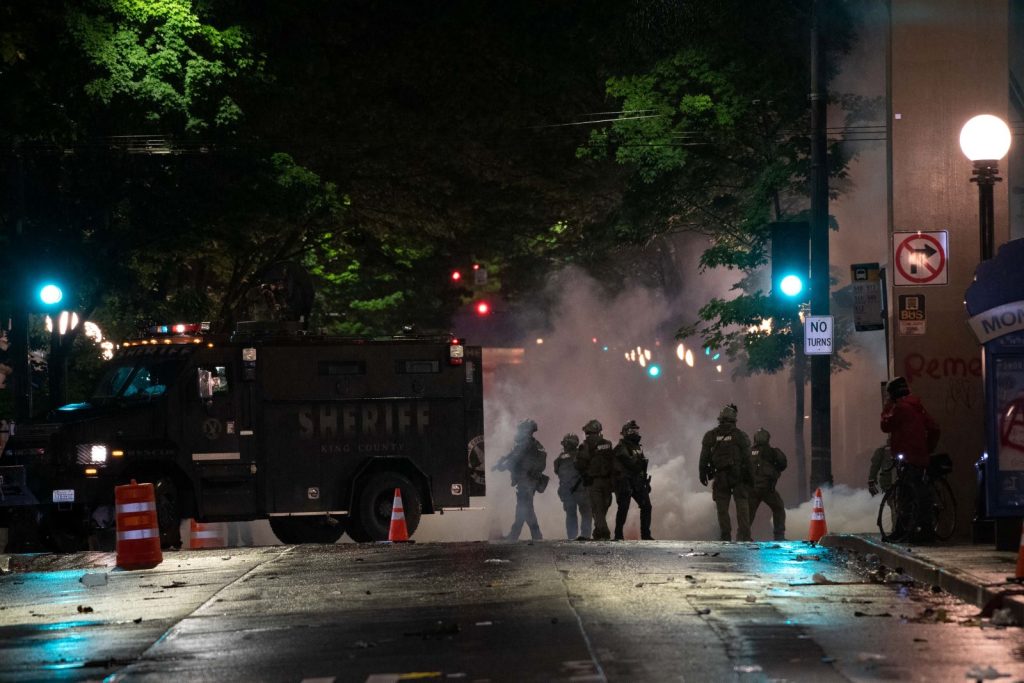
Mayor Bruce Harrell’s office appears to have deleted or is withholding negotiations used to make a crucial legal decision regarding the Mayor’s newly-minted Chief of Staff, Andrew Myerberg. The Urbanist reported on this document in May, and has been trying unsuccessfully to obtain a copy ever since.
Harrell’s office also appears to be violating the terms of the settlement agreement reached with the Seattle Times in 2023, following the paper’s discovery that former Mayor Jenny Durkan, former Seattle Police Chief Carmen Best, and several other employees in Durkan’s office deleted crucial text messages. These messages regarded the Capitol Hill Occupied Protest, established during the 2020 Black Lives Matter protests.
Both issues represent an egregious violation of the state’s Public Records Act (PRA). Mayor’s Office spokesperson Jamie Housen did not return The Urbanist’s direct request for comment.
Violated agreement
In the Seattle Times settlement, the City agreed to install software on all employees’ City-issued mobile devices to permanently retain text messages. That software is called TeleMessage.
But, in the course of searching for certain records created between Mayor Bruce Harrell and Deputy Mayor Tim Burgess, The Urbanist learned that messages can be deleted from the backup inbox TeleMessage creates, thereby appearing to not only defeat the purpose of the software, but possibly violate the terms of the settlement.
Furthermore, it is up to individual employees to move backed-up messages to the appropriate retention folders, and they only do this on what appears to essentially be an honors system.
The Urbanist had filed a records request asking for “all records created” between Mayor Bruce Harrell and Deputy Mayor Tim Burgess, regarding the outside investigation into mayoral Chief of Staff Andrew Myerberg conducted by law firm Seyfarth Shaw and commissioned by the City. Readers can find the most recent update to that story here.
According to the office, no such records exist — not even an email — despite the fact that the office had gone so far as to engage another legal party entirely to overturn certain findings against Myerberg in Seyfarth Shaw’s report. In short, Seyfarth Shaw found Myerberg had violated medical privacy laws, while the second opinion disagreed.
Monisha Harrell told The Urbanist that Myerberg and Burgess worked closely together, and that Myerberg started reporting to Burgess 2022, before she stepped down from her post. Originally, Myerberg had reported to her. This was before the Mayor’s Office sought outside legal counsel to overturn the findings against Myerberg. Myerberg only recently became chief of staff, after former mayoral Chief of Staff Jeremy Racca resigned.

Between leaving the OPA and becoming the mayor’s chief of staff, Myerberg served in other senior roles in the Harrell cabinet, garnering promotions from Harrell rather than the reprimand that may have occurred if the original findings had been sustained.
In the course of answering queries about the records request, the office claimed that there were no records either on Burgess’ phone or in TeleMessage.
On September 26, the records officer responsible for handling The Urbanist’s request told the publication that they had asked City Public Records Act (CPRA) staff in the City’s IT department about the TeleMessage backup. They sent along CPRA’s message:
“If a message is deleted from a cell phone, it’s gone from the phone. If the phone is enrolled in TeleMessage, the sent text will still be available via the email folder designated for sms capture. If the message is deleted from that email box, it will be purged from our system. TeleMessage does not keep back-up copies of our text messages.”
In other words, if a message is deleted from TeleMessage, it is gone forever.
At baseline, the fact that records can still be permanently deleted from TeleMessage appears to be a violation of the City’s settlement agreement with the Times.
“Just so you know,” the records officer continued, “everyone in the mayor’s office is set up with TeleMessage.”
The following day, The Urbanist followed up to ask what should be easily answerable, yes-or-no questions: “To confirm: Employees can delete messages backed up in the TeleMessage inbox? Is there any way to know if they did? Also, is there any oversight regarding deletion of messages from the TeleMessage backup inbox?”
The records officer said that they would ask and follow up. Pressed for more information several times, the records officer said that they asked the Mayor’s Office directly. The answer they sent along did not directly answer The Urbanist’s questions, but still appeared to confirm that employees not only have access to the backed-up messages, but that there is no oversight regarding deletions. Moreover, message retention appears to work on what is essentially an honors system.
“TeleMessage allows the City to capture and retain text messages in one location that can be searched centrally. TeleMessage integrates with mobile carriers (Verizon and ATT) to send a copy of the text message to a subfolder in a user’s Outlook mailbox for archiving,” the Mayor’s Office responded via the records officer. “The current preservation policy for this folder is 3 years. If the messages need to be retained because it documents substantive City business, the user needs to move the message to their appropriate retention folder.”
It is immediately unclear whether “one location” is the same thing as the subfolder, but, given the fact that the Mayor’s Office was explaining how TeleMessage works, it appears likely that this location is the same as the subfolder in the employee’s Outlook mailbox. TeleMessage also did not return requests for comment.
The office also said that “an employee should limit texting regarding City business to transitory content that can be deleted once the message serves its purpose.”
The City did not define what a “transitory record” is, who decides what such a record is, and when it has “serve[d] its purpose.” The Urbanist asked the Mayor’s Office, but did not receive an answer before the time of publication.
The Washington Coalition for Open Government (WashCOG) noted that the City had installed TeleMessage “following revelations that public officials deleted or lost thousands of text messages around the time of the street unrest of 2020.”
“The scandal damaged Seattle’s credibility,” WashCOG continued. “City officials need to be forthcoming about the effectiveness of its archiving service. Seattle residents deserve to know whether the city’s archiving is reliable and secure. The city also has to meet the terms of a related settlement agreement over public records with The Seattle Times.”
Missing Legal Contract
In May, The Urbanist discovered that Harrell’s office had decided to contract with Seattle-based Pacifica Law Group to overturn medical privacy violation findings against Myerberg.
The original case regarded the protestor whose heart stopped, after Officer Carl Anderson hit her in the chest with a blast ball on June 8, 2020. The video of the incident circulated widely, and became one of the handful of high-profile cases from that summer.

In his initial findings, Myerberg used the protestor’s blood alcohol level as a possible reason for why her heart stopped, rather than the officer-deployed blast ball that hit her squarely in the chest. He released her blood alcohol level — private medical information that she never consented to give anyone — in a public-facing decision.
Notably, this decision has remained up and publicly accessible since then, despite the fact that The Urbanist received records in June indicating that the Office of Police Accountability’s (OPA) own legislative and policy counsel, Nelson Leese, told the office in January 2022 to “Remove facts re: [redacted] re: medical information” from that case.
The City of Seattle had entered into a contract with Seyfarth Shaw, one of the largest law firms in the country, to determine whether Myerberg and a handful of Seattle Police Department (SPD) officers had violated a 2020 protestor’s medical privacy. Seyfarth Shaw was investigating Myerberg in his now-former capacity as OPA director.
Following a protracted, years-long records disclosure process that was allegedly largely hampered by Inspector General Lisa Judge’s alleged practice of broadly withholding and altering records — as well as the Mayor’s Office improperly trying to withhold the final report — The Urbanist finally obtained the Seyfarth Shaw investigator’s final report.
The report found Myerberg had violated the protestor’s medical privacy.
The question of whether Myerberg violated medical privacy laws is something journalists (present company included) have been trying to answer for years. Readers can find the original stories about this City-obscured investigation here and here.
However, when The Urbanist asked the Mayor’s Office about it, office spokesperson Jamie Housen revealed that Harrell’s office opted to seek a second opinion: “The Mayor’s Office engaged outside counsel to provide additional analysis of the Seyfarth report’s findings. In consultation with outside counsel, the Mayor’s Office General Counsel came to a different conclusion than those in the Seyfarth report. Those conclusions were emailed to the OIG earlier this year.”
When The Urbanist asked whether it was usual practice for the Mayor’s Office to solicit another opinion in such matters, Housen replied, “This is the first time that an investigation regarding a former OPA director has been sent to the Mayor’s Office, but broadly speaking, it’s not uncommon for the Mayor’s Office to seek advice from outside counsel on complex legal matters.”
However, the office did not respond, when The Urbanist asked what other questions the Mayor’s Office had about the report, and what other complex legal matters similar to this one — in other words, ones involving high-ranking Seattle officials — the office has sought another opinion on.
The Urbanist subsequently requested the Pacifica Law contract the City would have had to have created with the law firm to have legally “engaged outside council.”
Such a document should have been easy to find. However, despite The Urbanist filing that request on May 29, the Mayor’s Office has since pushed out the installment fulfillment date four times.
Upon Harrell’s office pushing out the installment date for the fourth time, The Urbanist told the records officer in charge of the request that this appears to constitute an unreasonable delay.
The records officer said that they could not find the document.
“I appreciate your patience. I have taken proactive steps to locate the contract and have consulted with other individuals in the Mayor’s Office to track this down,” the officer wrote in an October 8 message. “We are continuing our search and will follow up with you soon. Once we locate the requested contract, I will be in contact with an invoice or an update.”
When The Urbanist asked whether the office had asked Pacifica for their copy of the contract, the office did not respond.
Instead of responding, it sent The Urbanist a completely unresponsive record from 2014, both billing The Urbanist the usual $1.25 per record installment and refusing to answer whether the office had asked Pacifica for its copy of the contract.
On October 10, immediately after receiving the unrelated record, The Urbanist notified the office that the record turned over was unresponsive, requested a refund for the unresponsive record, and again asked whether the office had asked Pacifica for the contract. The question of the contract still has not been answered.
“The city’s apparent inability to locate a contract with a law firm, or to say whether such a document even exists, suggests shortcomings with its records management,” WashCOG said. “State law requires public agencies to adopt rules for protecting and organizing public records. Many agencies have failed to do so, or to keep pace with digital technology. Too often the results are disorganized archives, time-consuming records searches and needless delays for requesters.”
“Transparency and accountability are essential ingredients for a healthy civic culture,” WashCOG continued. “The Public Records Act is a valuable part of our civic toolbox.”
The Public Records Act only works if officials adhere to it. It increasingly appears that this is not the case at the City of Seattle.
Correction: The initial draft stated Seyfarth Shaw is one of the world oldest law firms. Seyfarth Shaw was founded in 1945; there are firms that are much older.


